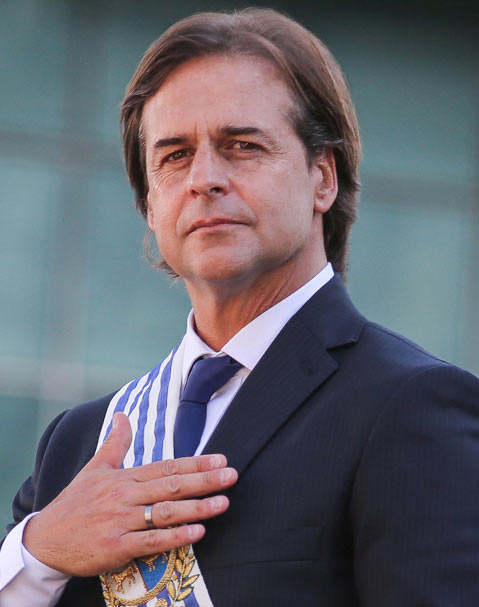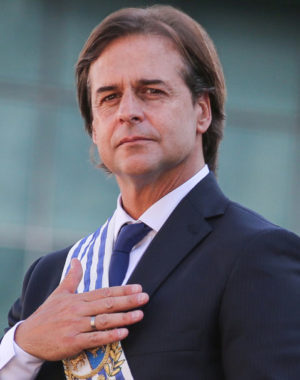



Born in Montevideo, he is the son of former President of Uruguay, Luis Alberto Lacalle, and Julia Pou, a former senator and first lady. Lacalle Pou attended The British Schools of Montevideo, and graduated from Catholic University of Uruguay in 1998. He has a law degree. From 2000 to 2015 he served as National Representative, and from 2015 to 2019 as Senator. In 2011 he held the position of President of the Chamber of Representatives, during the first session of the 47th Legislature.
Lacalle Pou, who has played many sports (rugby, soccer, tennis, boxing, etc.) in his youth, now enjoys surfing, a sport he’s been practicing since the 1980s. He married Lorena Ponce de León in 2000, in a service conducted by Daniel Sturla in the Montevideo Metropolitan Cathedral. Together, they have three children: Luis Alberto, Violeta and Manuel.
Vázquez was elected President on October 31, 2004, took office on March 1, 2005, and relinquished the office on March 1, 2010. As President, he presided over considerable improvements in education and working conditions, a significant expansion of the welfare system, and a dramatic reduction in poverty, with the percentage of Uruguayans living in poverty falling from 32% to 20% of the population from 2004 to 2009. Vázquez was returned to office in the 2014 presidential election.
Born in the Montevideo neighbourhood of La Teja, Tabaré Vázquez studied medicine at the Universidad de la República Medical School, graduating as an oncology specialist in 1972. In 1976, he received a grant from the French government, allowing him to obtain additional training at the Gustave Roussy Institute in Paris.
From 1990 to 1995, Vázquez was the Frente Amplio coalition’s first Mayor of Montevideo. In 1994, he made an unsuccessful run for president as the Frente Amplio candidate, receiving 30.6% of the vote. In 1996, he was elected leader of the Frente Amplio, replacing the historic leader of the left-wing coalition, Liber Seregni. He ran again in 1999, receiving 45.9 percent of the vote in the runoff election, losing to Jorge Batlle.
Vázquez is married to María Auxiliadora Delgado and has three biological children with her (Ignacio, Álvaro and Javier) and an adopted son (Fabián).
Source: https://en.wikipedia.org/wiki/Tabar%C3%A9_V%C3%A1zquez
Tabaré Ramón Vázquez Rosas, Former President of Uruguay
Tabaré Ramón Vázquez Rosas (pron IPA: [taβa’ɾe ra’mon ‘bahkes ‘rosas]) (born 17 January 1940) is the current President of Uruguay. A physician (oncologist) by training, he is a member of the centre-left Broad Front coalition (Frente Amplio in Spanish). Vázquez was elected president on October 31, 2004 and took office on March 1 2005, the first center-left president in Uruguayan history.
Background
Born in the Montevideo neighbourhood of La Teja, Vázquez studied medicine at the Universidad de la República Medical School, graduating as an oncology specialist in 1972. In 1976 he received a grant from the French government allowing him to obtain additional training at the Gustave Roussy Institute in Paris.
From 1990 to 1995, Vázquez was the Broad Front coalition’s first Mayor of Montevideo. In 1994, he made an unsuccessful run for president as the Frente Amplio candidate, receiving 30.6% of the vote. In 1996, he was elected leader of the Frente Amplio, replacing the historic leader of the left-wing coalition, Liber Seregni. He ran again in 1999, receiving 45.9% percent of the vote in the runoff election, losing to Jorge Batlle.
Tabaré is of Galician background.
Presidency
Tabaré Vázquez and vice president, Rodolfo Nin Novoa, during inauguration ceremonies.
In the 2004 elections, he won 51.7% of the valid votes, with 1,124,761 votes on the first ballot, eliminating the need for a runoff. He became the first Uruguayan president who didn’t belong to the so-called “traditional” parties, the National (Blanco) and Colorado parties.
With his own Frente Amplio holding a majority in Parliament, Vázquez was thought to have few obstacles to start with. He also has the support of the President of Brazil, Luiz Inácio Lula da Silva, also a centre-leftist.
Vázquez is a notable football fan. During his ten-year stint (1979-1989) as president of the Club Progreso team, it won the professional national championship in 1989.
Vázquez is married to María Auxiliadora Delgado and has three children with her (Ignacio, Álvaro and Javier) plus an adopted son, Fabián.
Policy
Vázquez has followed a cautious path regarding economic policy. Even though his Finance Minister, Danilo Astori, has followed a conservative policy regarding macroeconomic policy and debt repayment, the government has introduced a bill that aims to widely reform the taxation system in Uruguay.
The Broad Front ran on a platform of social justice. Vázquez has initiated an “emergency plan” (in Spanish Plan de Atención Nacional a la Emergencia Social or PANES) intended to address the most urgent needs of an estimated 200,000 Uruguayans for two years by investing $100 million in a number of programs which range from food assistance to health care. The plan, which has met with criticism over its bureaucracy, especially during its initial stages, is run under the responsibility of the Minister of Social Development, Marina Arismendi. It has been compared to Brazil’s plan Fome Zero at a smaller scale.
Among the most complex issues that have dominated his administration, is an ongoing conflict with Argentina over potential contamination from pulp mills being built on the Uruguayan side of the Uruguay river.
Human rights policy
In November 2005 his administration led a profound and significant victory in the investigation of human rights violations that had taken place during the military dictatorship. Having appointed a team of anthropologists and forensic investigators, and having ordered the military to cooperate and indicate possible sites for the unmarked graves, his government succeeded in unearthing remains of leftists disappeared during the 1970s military rule.
The Parliament, now with a majority of representatives from the Frente Amplio, has tried to approve laws legalizing abortion, currently banned under Uruguayan legislation since 1938. Vázquez has repeatedly announced his decision to use his veto power should Parliament approve any law making it legal.
Popularity
President Vázquez started with a 77% approval rating, but according to an opinion poll of Equipos Mori, his popularity had fallen to 45% by June 2006. This level of popularity is below the electoral support he received in the 2004 elections and is attributed by some analysts to the decision of the government led by Vázquez not to sign a Free Trade Agreement with the United States under pressure from the more radical base of his party, which may have alienated more conservative voters. Other moves by his administration concerning economic policy have met with resistance from trade unions and the left. However, as of October 2006, President Vázquez is still personally more popular than his government with a 62% approval rating.
Awards
In 2006, Vázquez was chosen to receive the World Health Organization (WHO) Director General’s Award in recognition of his leadership on tobacco control in Uruguay, which has implemented some of the most stringent tobacco control measures in the world.
Rishi Sunak, Prime Minister of the United Kingdom (since Oct 25, 2022) Rishi Sunak (born…
Giorgia Meloni, Prime Minister of Italy (since Oct 22, 2022) Giorgia Meloni (born 15 January…
Mahamat Déby, President of Chad (since Oct 10, 2022) Mahamat Idriss Déby Itno (born 1…
João Lourenço, President of Angola (sworn in on Sept 26, 2017) Sworn in for his…
William Ruto, President of Kenya (elected on Aug 9, 2022 with 50.5% of the vote)…
Gustavo Petro, President of Colombia (since Aug 7, 2022) Gustavo Francisco Petro Urrego ODB ODSC…
This website uses cookies.